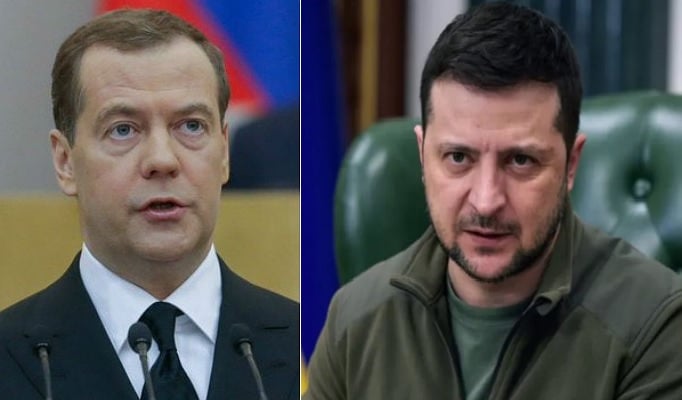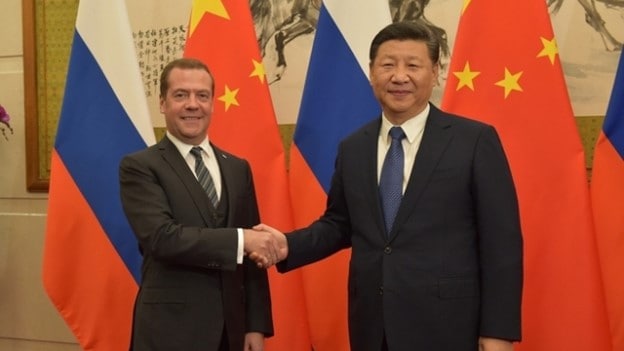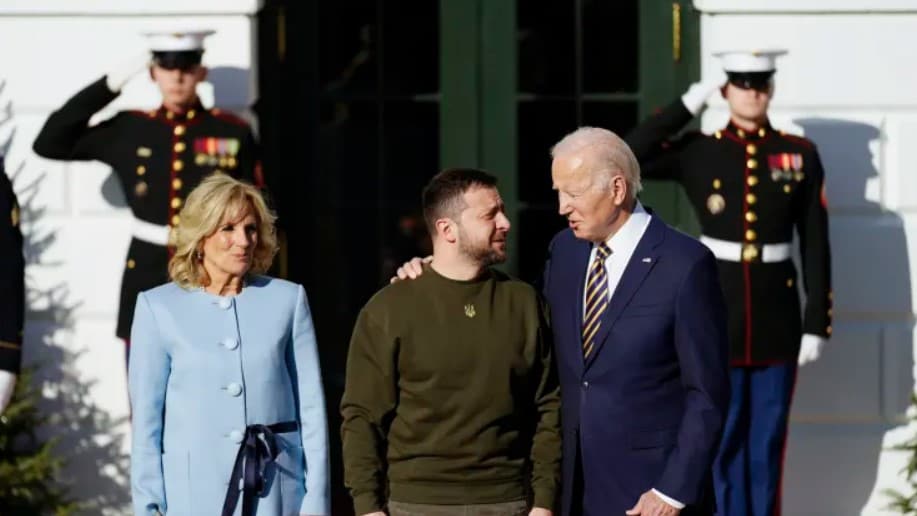It was impossible to ignore the nearly simultaneous character of Volodomyr Zelensky's visit to Washington and the visit by Dmitry Medvedev, Russia's former president and the current Deputy Chair of Russia's Security Council, to Beijing. The news of the Medvedev visit was released in Russia shortly after secrecy was lifted on Zelensky's impending visit to Washington in what seemed to be an effort to counteract this Ukrainian diplomatic success. While some in Russia belittled the Ukrainian President's visit and played up the importance of the Medvedev visit, there were also accounts that drew a contrast between the apparent success of Zelensky in Washington and what was seen as China's equivocal position.

Dmitri Medvedev and Volodomyr Zelensky conducted important visits at the same time (Source: Trud.ru)
One striking difference between the two visits was that the Zelensky-Biden meeting was between two heads of state, while the meeting between Medvedev and Xi Jin Ping was between the heads of ruling parties, United Russia and the Chinese Communist Party respectively. This led Kommersant columnist Dmitri Drize to write a column titled "Comrade Xi Jin Ping Resolutely Favors Peace". The use of the word "comrade" in the headline was meant as a throwback to Communist times where things were sorted out between Communist parties, although Drize referred to it as "a great innovation." Drize noted that despite the boilerplate lines about broad agreement between Russia and China, daylight existed between their positions: "China urges its Russian partner to end hostilities as soon as possible, preferably through dialogue. This also can be read as a call to Ukraine, so that it, too, would make concessions. But there is no doubt that Comrade Xi is strongly committed to peace... and, one might say, he suggests that it should not be particularly delayed." Drize also believed that Chinese disapproval induced Russia to abandon its nuclear saber-rattling.[1]
Another article in Kommersant noted Xi's words to Medvedev perhaps in response to the personal message that Medvedev presented him from Vladimir Putin. “China has always determined its position and policy based on facts, defended an objective and fair position, actively insisted on reconciliation and negotiations,” the Chinese leader told Dmitry Medvedev. He expressed hope that the parties to the conflict "will maintain rationality and restraint, hold a comprehensive dialogue, and resolve their security issues by political means." Professor Alexei Maslov, a China expert at Moscow State University, explained the logic behind China's ambiguous position: “This is the standard Chinese rhetoric in relation to absolutely all situations, not only in relation to Russia. China, roughly speaking, is for Russia, but against the military operation, since it seriously violates its plans related to interaction with Europe and the United States. China would not want to break with them now, and the Russian operation interferes with these plans. In addition, the Chinese concept of foreign policy is to solve everything exclusively through dialogue. And it turns out that Beijing is in an uncomfortable position. He supports a country that is obviously conducting hostilities, but he cannot help but support it, because then he would side with the West. The PRC is in an ambiguous situation, which is why it calls for peace. [2]
Medvedev and his dispatcher Putin should have been forewarned, wrote journalist Gennady Petrov in Nezavisimaya Gazeta (NG) as immediately prior to Medvedev's visit, Xi outlined China's view of the Ukrainian events. The press service of the Chinese Foreign Ministry reported that in a telephone conversation with German President Frank-Walter Steinmeier, the Chinese President insisted on the need for "reconciliation and advancement of negotiations" and stressed that "prolonging and complicating the crisis is not in the interests of each of the parties." It was therefore probably that Medvedev heard more of the same.[3]

Dmitri Medvedev with comrade Xi (Source: Regnum.ru)
The pro-Kremlin political scientist Sergei Markov speculated that the Putin letter to Xi may have reproached China for its equivocal policy on the conflict and failure to extend full backing to Russia: Perhaps Putin asked [Medvedev] to enunciate that if China continues to take a neutral position, at a time when Russia is fighting the main enemy of China - the United States ... In the end, it may turn out that in the future China will fight the US without the help of Russia. What is there to do? A year has passed, China has not done anything. It is possible that Putin is asking China for large quantities of weapons, military equipment, relatively speaking, helmets and body armor, something that the Russian economy cannot produce. The third option is that Russia is asking China to ignore US sanctions and sell technology, and sharply intensify economic relations."[4]
Others, and most notably Medvedev himself, sought to put the visit in a positive light. “We discussed issues of interaction between the two ruling parties - between the Communist Party of China and United Russia. We discussed issues of bilateral cooperation, our strategic partnership in all areas, including, of course, industrial cooperation and much more. We discussed the international situation, as well as the conflict in Ukraine. These negotiations were very useful,” Dmitry Medvedev said in a video posted on his Telegram channel. Medvedev's office issued a press release stating “The parties synchronized their watches on a number of significant issues of an international nature, stating the broad coincidence of the approaches of Moscow and Beijing to the most pressing world problems.[5]
The most optimistic reading for Russia of the Medvedev-Xi meeting was provided by political scientist Rafael Ordukhanyan. He believed that the meeting presaged the creation of a military-political alliance between China and Russia in the foreseeable future:
“To all appearances, an agreement in principle has been reached between China and Russia on the issues of Taiwan and Ukraine - Russia has declared its understanding of the requirements and goals set by China in relation to Taiwan, and China, apparently, has understood our concern about the situation in Ukraine." This meant that a “powerful anti-American bloc” could soon make its appearance on the global stage.[6]
SUPPORT OUR WORK

On the Zelensky visit, Kommersant's coverage noted Zelensky's success in reaching the hearts of Americans.
"No jackets or ties - the Ukrainian leader, even when he found himself in the holy of holies of American democracy, was not going to lose his image and tried to show the US legislators in every detail that they were facing the president of a warring country."
"Both Democrats and Republicans were in the room. There were almost no places. And this once again confirmed that Volodymyr Zelensky, despite individual votes, can count on bipartisan support.
"The Congress liked it and burst into applause. It was evident that the Ukrainian leader got through to the hearts of American legislators."[7]
Petrov viewed the Zelensky visit as a joint success of Biden and Zelensky in shoring up bipartisan support for aiding Ukraine, particularly as the Republicans will be shortly in control of the House of Representatives.
" Apparently, Biden wanted to time Zelensky’s visit to [coincide with] the completion of Congress’s work on a $40 billion supplementary financing package for Ukraine. The announcement of an aid package for this country was also scheduled for December 21. It amounts to $2 billion and deals exclusively with the security field. Thus, Zelensky's visit also had an important symbolic character for Biden personally. The presence of the Ukrainian leader highlighted the White House's political victory. It managed to push through the next aid package to Ukraine relatively easily.
"During the November election campaign, a number of Republican congressmen publicly announced the need to audit the funds allocated to this country. As Vladimir Vasilyev, chief researcher at the Institute for the US and Canadian Studies of the Russian Academy of Sciences, noted in an interview with NG, this was part of the general course of the party, and primarily by Donald Trump supporters. The Republicans insisted on optimizing government spending and had to register that on significant issues, including international politics, they have a different position than Biden. However, for the Republicans the midterm Congressional elections concluded only with a victory in the struggle for the lower house. Moreover, Trump's staunch supporters performed worse than expected.
"All this left an imprint on the discussion of Ukrainian topics. Already on November 18, the day after the vote, a group of only 11 Republicans - members of the House of Representatives introduced a bill to audit funds allocated to Ukraine. Its initiator is Congresswoman Marjorie Taylor Green, a staunch Trumpist. She is the only member of the US legislature who admits the possibility of not only an audit, but also cuts in aid to Ukraine. At the same time, she cannot be regarded as one of the authoritative and influential party figures. We can say that there is currently no opposition in Congress to the strengthening of support for Ukraine."[8]

Zelensky with the Bidens (Source: Ria.ru)
Sergei Markov, as a regime surrogate, voiced the expectation that the connection with Biden would ultimately damage Ukraine's standing among Republicans:
“The meeting between Zelensky and Biden brought nothing new. Zelensky is a great actor, he does a good job of playing the role of the President of Ukraine, although he is not. He is an illegally appointed puppet of the United States who is following Washington's orders. His speech in Congress was very necessary for Biden, since now the Republican majority will cut funding for Biden's Ukrainian project. It's not that the Republicans somehow dislike Russia or dislike Zelensky, they just hate Biden. They can start coming up with the logic 'Whatever is good for Biden is bad for us', and we will cut it down. The meeting between Zelensky and Biden is a theatrical show.”
“The war in Ukraine is Biden’s personal war against Putin. This is Biden's revenge for the fact that despite Biden's direct demand that Putin not run for a third term, Putin ran for the presidency. That's what the kids are dying for."[9]
[1] Kommersant.ru, December 21, 2022.
[2] Kommersant.ru, December 21, 2022.
[3] Ng.ru, December 21, 2022.
[4] Nsn.fm, December 21, 2022.
[5] Ng.ru, December 21, 2022.
[6] Eadaily.ru, December 22, 2022.
[7] Kommersant.ru, December 22, 2022.
[8] Ng.ru, December 21, 2022.
[9] Nedely.ru, December 22, 2022.




